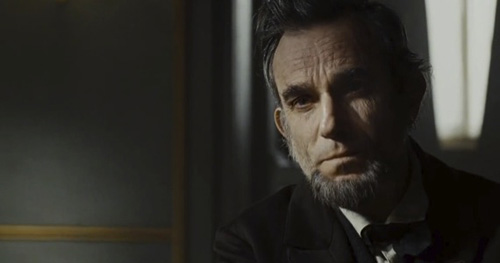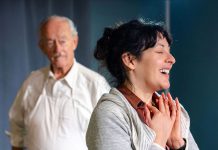Lincoln at the movies
The most surprising thing to many who see Steven Spielberg’s grand film biography Lincoln, is how British actor Daniel Day Lewis sounds in the starring role. We are accustomed to hearing deep voices like Henry Fonda, Raymond Massey, or Royal Dano, the actor who Walt Disney personally picked to be the voice of his audio-animatronic Lincoln mannequin at his Disneyland amusement parks.
But, Daniel Day Lewis’ Lincoln talks in a high-pitched voice with a distinctive middle-American accent. In an AP interview the actor explains: “I’ve no doubt in my mind that when you think of all the influences in his life, from his childhood in Kentucky and Indiana and a good part of his younger life in southern Illinois, that the sounds of all those regions would have come together in him somehow.”
The screenplay for Lincoln was penned by Tony Kushner from several sources, most notably Doris Kearns Goodwin’s Team of Rivals: The Political Genius of Abraham Lincoln. Goodwin says that Lincoln is the third most written about historical figure in the English language (Jesus and Shakespeare are #1 and #2). As the list below shows, Lincoln has also been a popular figure in movies for over 100 years.
The Reprieve: An Episode in the Life of Abraham Lincoln (1908) is a silent film directed by Van Dyke Brook from an episode in Lincoln’s life where he pardoned a sleeping Union Army sentry. The story was remade a half dozen times by other film studios.
Lincoln: Man of the People (1923) was the first sound film featuring the 16th President. The inventor Lee De Forest* used his synchronized Phonofilm process to record and film poet Edwin Markham reciting his own poem at the opening ceremony for the Lincoln Memorial on May 30, 1922.
D.W. Griffith’s Abraham Lincoln (1930) was the great director’s attempt to make amends for his positive portrayal of the Ku Klux Klan in his international hit, Birth of a Nation aka The Klansman (1919). Griffith’s first sound film starred Walter Huston as Lincoln, and Una Merkel as the Illinois lawyer’s first love, Ann Rutledge. The screenplay was co-written by poet and novelist Stephen Vincent Benet, and although it was not popular when it was released, it is now considered one of the finest movie portraits of Lincoln’s life.
The Littlest Rebel (1935) teamed the curly-headed megastar Shirley Temple with Bill “Bojangles” Robinson as a slave on her family’s plantation. Racist stereotypes are rampant to modern viewers’ eyes, with the “darkies” worrying about what they will do if they are freed. Temple sings “Dixie” and “Polly-Wolly-Doodle,” and dances with Robinson in a “pass the hat” scene to raise money to go to Washington to plea with President Lincoln (Frank McGlynn) to pardon the girl’s imprisoned father. Temple was quoted at the time: “Of course the pardon has to be granted. We can’t make a heavy out of Lincoln.”
Young Mr. Lincoln (1939) starred Henry Fonda as the rail splitting lawyer in love. Directed by John Ford (who directed John Wayne in Stagecoach the same year), the focus is a murder case where Lincoln uses Sherlock Holmes-style deduction to defend two men falsely accused of murder.
Abe Lincoln in Illinois (1940) cast Raymond Massey as the President-to-be direct from the Broadway stage where he played the same part. Avoiding the Civil War and assassination, it presents Lincoln’s life from leaving Kentucky to getting elected the 16th President of the United States. A staple in U.S. history classes for decades, the film was a financial flop when it first appeared, losing $740,000.
Abraham Lincoln: Vampire Hunter (2012) Abe witnessed his mother being killed by a vampire when he was a boy, and he later learns to hunt and kill the fearsome creatures with his rail-slitting axe. Benjamin Walker plays Lincoln in a screenplay written by Seth Grahaeme-Smith from his own novel. Audiences learn that vampires strongly supported the Confederacy because they could buy slaves as food.
* In my family-story-based novel The Marvelous Journals of Miss Virginia Pettingill, Lee DeForest does a test of his synchronized sound/film process in the Stand Theater in Gloucester, Massachusetts in 1922. Virginia and her best friend Tibby watched Broadway star Eddie Cantor sing and dance and tell jokes onscreen.
Comments? E-mail gi*********@*****st.net.








